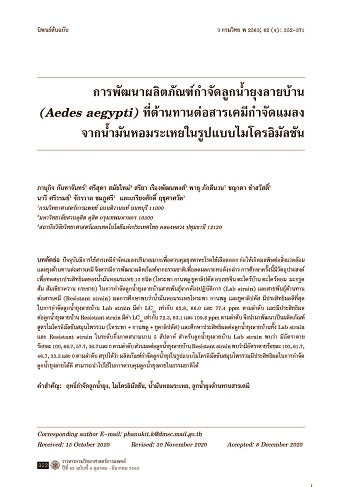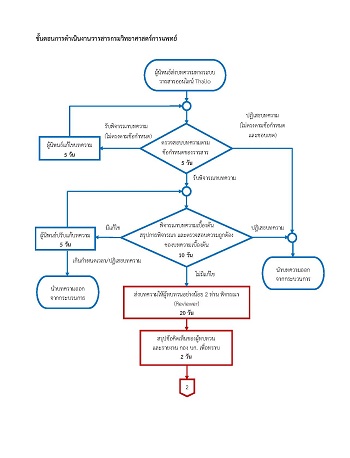การพัฒนาผลิตภัณฑ์กำจัดลูกน้ำยุงลายบ้าน (Aedes aegypti) ที่ต้านทานต่อสารเคมีกำจัดแมลงจากน้ำมันหอมระเหยในรูปแบบไมโครอิมัลชัน
คำสำคัญ:
ฤทธิ์กำจัดลูกน้ำยุง, ไมโครอิมัลชัน, น้ำมันหอมระเหย, ลูกน้ำยุงต้านทานสารเคมีบทคัดย่อ
ปัจจุบันมีการใช้สารเคมีกำจัดแมลงปริมาณมากเพื่อควบคุมยุงพาหะโรคไข้เลือดออก ก่อให้เกิดมลพิษต่อสิ่งแวดล้อมและยุงต้านทานต่อสารเคมี จึงควรมีการพัฒนาผลิตภัณฑ์จากธรรมชาติเพื่อลดผลกระทบดังกล่าว การศึกษาครั้งนี้มีวัตถุประสงค์เพื่อทดสอบประสิทธิผลของน้ำมันหอมระเหย 10 ชนิด (โหระพา กานพลู ยูคาลิปตัส อบเชยจีน ตะไคร้บ้าน ตะไคร้หอม มะกรูด ส้ม ส้มเขียวหวาน กระชาย) ในการกำจัดลูกน้ำยุงลายบ้านสายพันธุ์จากห้องปฏิบัติการ (Lab strain) และสายพันธุ์ต้านทานต่อสารเคมี (Resistant strain) ผลการศึกษาพบว่าน้ำมันหอมระเหยโหระพา กานพลู และยูคาลิปตัส มีประสิทธิผลดีที่สุดในการกำจัดลูกน้ำยุงลายบ้าน Lab strain มีค่า LC50 เท่ากับ 62.8, 66.0 และ 77.4 ppm ตามลำดับ และมีประสิทธิผลต่อลูกน้ำยุงลายบ้าน Resistant strain มีค่า LC50 เท่ากับ 72.3, 83.1 และ 109.6 ppm ตามลำดับ จึงนำมาพัฒนาเป็นผลิตภัณฑ์สูตรไมโครอิมัลชันสมุนไพรรวม (โหระพา + กานพลู + ยูคาลิปตัส) และศึกษาประสิทธิผลต่อลูกน้ำยุงลายบ้านทั้ง Lab strain และ Resistant strain ในระดับกึ่งภาคสนามนาน 5 สัปดาห์ สำหรับลูกน้ำยุงลายบ้าน Lab strain พบว่า มีอัตราตายร้อยละ 100, 66.7, 57.7, 36.7 และ 0 ตามลำดับ ส่วนผลต่อลูกน้ำยุงลายบ้าน Resistant strain พบว่ามีอัตราตายร้อยละ 100, 61.7, 46.7, 33.3 และ 0 ตามลำดับ สรุปได้ว่า ผลิตภัณฑ์กำจัดลูกน้ำยุงในรูปแบบไมโครอิมัลชันสมุนไพรรวมมีประสิทธิผลในการกำจัดลูกน้ำยุงลายได้ดี สามารถนำไปใช้ในการควบคุมลูกน้ำยุงลายในธรรมชาติได้
เอกสารอ้างอิง
Hadinegoro SR, Arredondo-Garcia JL, Capeding MR, Deseda C, Chotpitayasunondh T, Dietze R, et al. Efficacy and long-term safety of a dengue vaccine in regions of endemic disease. N Engl J Med 2015; 373(13): 1195-206.
Nour AH, Nour A, Yusoff M, Sandanasamy J. Bioactive compounds from Basil (Ocimum basillicum) essential oils with larvicidal activity against Aedes aegypti larvae. 3rd International Conference on Biology, Environment and Chemistry (IPCBEE) 2012; 46: 21-4.
Hamdan DI, Mohamed ME, Abdulla RH, Mohamed SM, El-Shazly AM. Anti-inflammatory, insecticidal and antimicrobial activities and chemical composition of the essential oils of different plant organs from navel orange (Citrus sinensis (L.) Osbeck var. Malesy) grown in Egypt. J Med Plants Res 2013; 7(18): 1204-15.
Gutierrez PM, Antepuesto AN, Eugenio BAL, Santos MFL. Larvicidal activity of selected plant extracts against the dengue vector Aedes aegypti mosquito. Int Res J Biological Sci 2014; 3(4): 23-32.
Duarte JL, Amado JRR, Oliveira AEMFM, Cruz RAS, Ferreira AM, Souto RNP, et al. Evaluation of larvicidal activity of a nanoemulsion of Rosmarinus officinalis essential oil. Rev Bras Farmacogn 2015; 25: 189-92.
Soradech S, Kusolkumbot P, Thubthimthed S. Development and characterization of microemulsions containing Tiliacora triandra Diels as an active ingredient for antioxidant and melanogenesis stimulating activities. J App Pharm Sci 2018; 8(3): 46-54.
Fansiri T, Thavara U, Tawatsin A, Krasaesub S, Sithiprasasna R. Laboratory and semi-field evaluation of Mosquito Dunks® against Aedes aegypti and Aedes albopictus larvae (Diptera: Culicidae). Southeast Asian J Trop Med Public Health 2006; 37(1): 62-6.
สมเกียรติ บุญญะบัญชา. ประสิทธิภาพของน้ำมันหอมระเหยจากพืชบางชนิดต่อยุงลาย (Aedes aegypti L.). [วิทยานิพนธ์]. ภาควิชาพืชศาสตร์และทรัพยากรการเกษตร, คณะเกษตรศาสตร์. ขอนแก่น: มหาวิทยาลัยขอนแก่น; 2536.
Manimaran A, Cruz MMJJ, Muthu C, Vincent S, Ignacimuthu S. Larvicidal and knockdown effects of some essential oils against Culex quinquefasciatus Say, Aedes aegypti (L.) and Anopheles stephensi (Liston). Adv Biosci Biotechnol 2012; 3: 855-62.
Sukkanon C, Yaicharoen R, Ngrenngarmlert W. Comparative effectiveness of monomolecular surface film on Aedes aegypti (L.) and Anopheles minimus (Theobald) (Diptera: Culicidae). Agric Nat Resour 2016; 50: 465-9.




